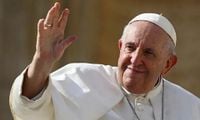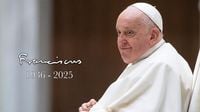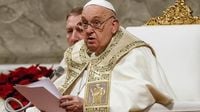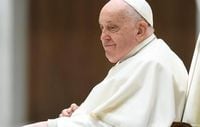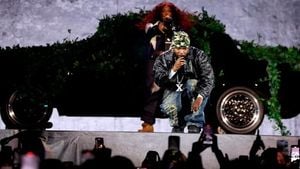In a poignant announcement that reverberated around the globe, Cardinal Kevin Farrell declared the death of Pope Francis on April 21, 2025, at 7:35 AM local time (12:35 PM Hanoi time). Speaking on Vatican television, Farrell expressed the deep sorrow felt by the Catholic community, stating, "Dear brothers and sisters, with deep sorrow, I must announce the passing of Pope Francis. His entire life was dedicated to serving God and His Church." This marks a significant moment in history as the world mourns the loss of a leader who has profoundly influenced the Catholic faith and beyond.
Pope Francis, born Jorge Mario Bergoglio on December 17, 1936, in Buenos Aires, Argentina, was the first pope from the Americas and the Southern Hemisphere. Elected in March 2013, he became one of the oldest popes in the history of the Church. His journey to the papacy was marked by a commitment to social justice, compassion for the marginalized, and an unwavering dedication to the values of the Gospel. Farrell noted, "He taught us to live the values of the Gospel with fidelity, courage, and universal love, especially for the poorest and most marginalized."
Before his passing, Pope Francis had been battling serious health issues for several months. On February 14, 2025, he was hospitalized due to acute respiratory failure resulting from an infection. His condition was described as critical, with reports of acute asthma attacks, mild kidney failure, and bronchospasm. He required non-invasive ventilator support at night and high-flow oxygen therapy during the day. Despite these challenges, he made a brief appearance on the balcony of St. Peter's Basilica during the Easter celebration on April 20, 2025, addressing thousands of followers and emphasizing the importance of hope and renewal.
In his final days, the Vatican reported that his health had deteriorated significantly. On February 22, 2025, it was announced that he was in a critical condition, experiencing prolonged difficulty breathing akin to asthma, which necessitated high-flow oxygen. He also underwent a blood transfusion due to a low platelet count. These alarming health developments led many to speculate about the future of the papacy.
The Vatican has indicated that the process of mourning will soon transition into the selection of a new pope. Traditionally, this process can take two to three weeks. In the meantime, the Catholic community is encouraged to reflect on the legacy of Pope Francis and the values he championed during his papacy.
Notably, Pope Francis had a profound impact on interfaith dialogue and sought to bridge divides among different religions. He consistently advocated for the dignity of all people, regardless of their faith or background, and emphasized the importance of compassion and understanding in a world often marked by division.
In a statement made during his Christmas Eve Mass on December 24, 2024, Pope Francis highlighted the need for renewal and hope, urging Catholics to strive for a better world free from injustice and suffering. His message resonated deeply with followers, reinforcing his commitment to social justice and humanitarian efforts.
As the Catholic Church prepares for the transition in leadership, the funeral of Pope Francis is set to be a simpler affair than those of his predecessors. He had approved plans to simplify the papal funeral, opting for a simple wooden coffin with padding inside, and abolished the tradition of placing the pope's body on a high platform for public viewing. Instead, the faithful will be invited to pay their respects to the late pope in a more intimate setting.
In a historic move, Pope Francis will be the first pope in over a century to be buried outside the Vatican. His final resting place will be at the Basilica of St. Mary Major in Rome, a decision that reflects his desire for simplicity and accessibility for the faithful.
The impact of Pope Francis's leadership extended beyond the Catholic Church. His advocacy for climate action, social justice, and the plight of refugees and migrants resonated with many around the world. He often used his platform to address pressing global issues, urging leaders to take action and prioritize the needs of the most vulnerable.
As the world reflects on the legacy of Pope Francis, many will remember his warmth, humility, and unwavering commitment to the teachings of Christ. His passing marks the end of an era, but his influence will undoubtedly continue to inspire future generations.
In the coming weeks, cardinals will gather to elect a new pope, and the world will watch closely as the Catholic Church navigates this period of transition. The spirit of Pope Francis, with his call for fraternity and compassion, will undoubtedly guide the Church as it moves forward.
